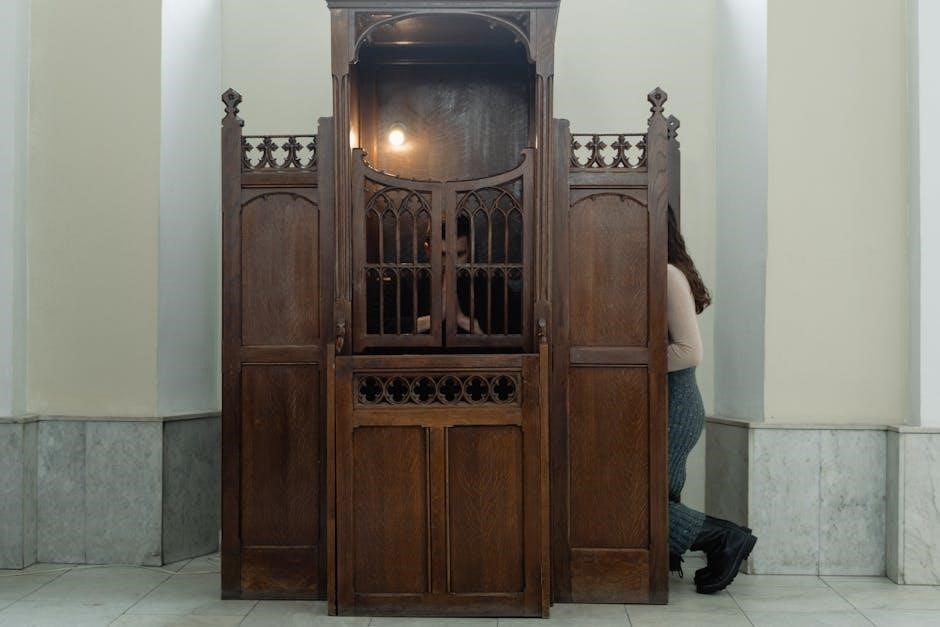
catholic confession guide for adults pdf
Catholic Confession‚ or Reconciliation‚ is a sacrament offering forgiveness for sins committed after Baptism. This guide helps adults understand and participate effectively in the process.
What is Catholic Confession?
Catholic Confession‚ also known as the Sacrament of Reconciliation‚ is a sacred ritual where adults confess their sins to a priest‚ seeking forgiveness and spiritual healing. Instituted by Christ‚ it restores sanctifying grace lost through mortal sin‚ offering a path to divine mercy and reconciliation with God and the Church.
The Biblical Basis of Confession
The sacrament of Confession is rooted in Scripture‚ with Jesus granting the apostles the power to forgive sins in John 20:22-23. This divine institution underscores God’s mercy and humanity’s need for reconciliation‚ emphasizing that Christ came to call sinners to repentance‚ as stated in Mark 2:17.

Purpose of Confession for Adults
Confession for adults serves as a means to seek forgiveness for sins‚ restoring sanctifying grace and fostering spiritual growth through reconciliation with God and the Church.
Forgiveness of Sins
Confession provides forgiveness for mortal sins‚ restoring sanctifying grace lost through sin. Through the priest‚ acting as Christ’s representative‚ penitents receive absolution‚ reconciling them with God and the Church. This sacrament cleanses the soul‚ offering spiritual renewal and peace.
Spiritual Growth and Renewal
Confession fosters spiritual growth by encouraging self-reflection and accountability. Regular participation helps adults deepen their relationship with God‚ leading to personal transformation and a Christ-centered lifestyle. Through examination of conscience and prayer‚ individuals gain clarity on their actions‚ fostering humility and a commitment to virtuous living.

Preparing for Confession
Preparing for Confession involves reflecting on your actions‚ praying for guidance‚ and being ready to humbly state your sins. This helps ensure a meaningful experience.
Examination of Conscience
An examination of conscience involves reflecting on your actions‚ thoughts‚ and omissions to identify sins. Adults should consider areas like marriage‚ parenting‚ and work. Prayer and self-reflection help prepare for confession by fostering honesty and accountability‚ ensuring a sincere acknowledgment of sins and a commitment to change.
Prayer Before Confession
Praying before confession helps prepare the heart and mind. A common prayer is: “Dear Jesus‚ help me make a good confession. Show me my sins and give me true sorrow.” This prayer seeks guidance‚ sincerity‚ and grace to acknowledge sins honestly‚ fostering a contrite spirit essential for a meaningful confession.
Step-by-Step Guide to the Confession Process
The sacrament involves greeting‚ confessing sins‚ receiving penance‚ praying the Act of Contrition‚ and concluding with absolution‚ restoring grace and spiritual peace to the soul.
Greeting and Initial Prayer
The process begins with a priest greeting the penitent in Christ’s name. The penitent responds with a blessing request‚ stating the time since their last confession. An initial prayer sets a reverent tone‚ inviting the Holy Spirit’s guidance and preparing the heart for sincere repentance and healing through the sacrament.
Confessing Sins
During confession‚ the penitent humbly and clearly states their sins‚ specifying the type and approximate number if mortal. This forthright approach‚ without unnecessary details‚ enables the priest to offer appropriate guidance and support‚ fostering a sincere and effective confession.
Receiving Penance
After confessing sins‚ the priest assigns penance‚ such as prayers or actions‚ to express sorrow and repair harm caused by sin. The penitent commits to fulfilling this penance promptly‚ reflecting their resolve to grow spiritually and respond to God’s mercy.
Prayer of Absolution
The priest extends his hands and prays the Prayer of Absolution‚ invoking God’s mercy to forgive the confessed sins. This prayer is the culmination of the sacrament‚ restoring the penitent to God’s grace and reconciling them with the Church‚ as granted by Christ’s authority to the apostles in John 20:23.
Closing the Confession
The priest dismisses the penitent with a blessing‚ marking the end of the sacrament. The individual leaves‚ feeling reconciled with God and the Church‚ ready to complete the assigned penance and live a renewed life according to God’s will.

Understanding Contrition
Contrition is the heartfelt sorrow and repentance for sins‚ essential for seeking forgiveness in the sacrament of reconciliation‚ reflecting a sincere desire to change and grow spiritually.
What is Contrition?
Contrition is the sincere and heartfelt sorrow for having offended God‚ accompanied by the firm intention to amend one’s life. It is a fundamental requirement for the sacrament of reconciliation‚ involving both an inward regret for sins and an outward expression of that regret through confession and penance.
Cultivating True Sorrow for Sins
Cultivating true sorrow involves prayer‚ reflection‚ and self-examination to recognize the gravity of one’s sins. It requires an honest acknowledgment of wrongdoing and its impact on relationships with God and others. True sorrow goes beyond mere confession; it involves a commitment to change and a desire to seek God’s grace and forgiveness.
The Role of Penance
Penance is a vital part of the sacrament‚ serving as a means to make amends for sins and strengthen one’s relationship with God through prayer and good works.
Purpose of Penance
Penance serves as a response to God’s mercy‚ helping individuals make amends for their sins and grow spiritually. It is not merely punishment but a means to express sorrow and commit to change‚ fostering personal transformation and deeper union with God through prayer‚ reflection‚ and acts of charity.
Examples of Penances
Examples of penances include specific prayers‚ such as the Our Father or Hail Mary‚ acts of charity‚ like helping the needy‚ and spiritual reflections. These acts help the penitent grow spiritually and express genuine sorrow for their sins‚ fostering a deeper commitment to faith and personal transformation.
Benefits of Regular Confession
Regular confession fosters spiritual growth‚ renewal‚ and a deeper connection with God. It brings peace of mind and reduces the burden of sin in one’s life.
Spiritual Benefits
Regular confession strengthens the soul‚ deepens faith‚ and fosters reconciliation with God and the Church. It restores sanctifying grace‚ renews the Holy Spirit’s presence‚ and offers spiritual clarity.
Through confession‚ adults gain humility‚ discernment‚ and a stronger commitment to following Christ‚ enabling a more devout and purposeful spiritual life.
Emotional and Psychological Benefits
Regular confession brings emotional relief by releasing guilt and anxiety‚ fostering inner peace. It encourages accountability and self-reflection‚ promoting mental clarity. Sharing burdens with a priest provides solace‚ reducing stress and enhancing overall well-being. This sacrament helps adults achieve emotional healing and stability‚ strengthening their mental health and faith journey.

Frequency of Confession
The Church requires at least annual confession‚ especially before Easter. Monthly confession is encouraged for spiritual growth‚ fostering a disciplined and reflective faith practice.
Church Guidelines
The Catholic Church mandates confession at least once annually‚ particularly before Easter. Monthly confession is recommended for spiritual growth. The Church emphasizes contrition and the priest’s role in absolution‚ ensuring the sacrament’s efficacy. Regular participation aligns with Church teachings‚ fostering a disciplined approach to faith and moral renewal.
Monthly Confession for Spiritual Growth
Monthly confession fosters spiritual growth by encouraging regular self-reflection and accountability. It helps maintain a Christ-centered lifestyle‚ allowing individuals to continuously examine their actions and thoughts. This practice promotes consistent moral improvement and a deeper connection with God‚ essential for a balanced and devout life.

Common Mistakes to Avoid
Overlooking mortal sins and being unprepared are frequent errors. Ensure thorough examination of conscience‚ avoid excessive details‚ and approach confession with sincerity and humility for genuine forgiveness.
Overlooking Mortal Sins
Overlooking mortal sins is a common mistake that hinders spiritual growth. Failing to confess mortal sins prevents receiving God’s forgiveness and restored grace. Unlike venial sins‚ mortal sins must be acknowledged and confessed directly. Reflect on actions‚ attitudes‚ and omissions during examination of conscience to ensure no grave sins are omitted‚ fostering genuine reconciliation with God and the Church.
Being Unprepared
Being unprepared for confession can hinder spiritual growth and genuine reconciliation. Skipping examination of conscience or failing to reflect on sins leads to incomplete confession. Arrive with a humble heart‚ ready to acknowledge faults honestly. Preparation includes prayer‚ self-reflection‚ and understanding the sacrament’s purpose‚ ensuring a fruitful and meaningful experience of God’s mercy and forgiveness.
Special Considerations
Special considerations include confession for the elderly or homebound‚ ensuring accessibility for those unable to attend in person. Anonymous confession options are also available.
Confession for the Elderly or Homebound
Confession is accessible to the elderly or homebound through special arrangements‚ such as priest visits. Guides for this group address unique life circumstances‚ ensuring spiritual care. Printer-friendly versions are available for easy use‚ focusing on relevant sins and offering practical advice for those unable to attend in person.
Anonymous Confession
Anonymous confession allows individuals to confess their sins confidentially‚ without revealing their identity. This option is available in many churches‚ either behind a screen or face to face. It ensures privacy and comfort‚ helping penitents feel at ease while seeking forgiveness and spiritual guidance in a safe environment.
Catholic Confession offers forgiveness‚ healing‚ and spiritual renewal. Regular participation strengthens faith and fosters a deeper connection with God‚ encouraging a life of grace and moral integrity.
Final Thoughts on the Importance of Confession
Catholic Confession is a powerful sacrament for spiritual repair and growth. It offers forgiveness‚ healing‚ and renewal‚ enabling believers to deepen their relationship with God. By acknowledging sins and seeking absolution‚ adults experience divine mercy‚ fostering a life of virtue and integrity. Regular confession cultivates self-awareness‚ humility‚ and a stronger commitment to faith‚ benefiting both personal and communal spiritual well-being.
Encouragement for Regular Participation
Regular confession fosters spiritual growth and strengthens one’s relationship with God. By participating monthly‚ adults can reflect on their actions‚ seek forgiveness‚ and grow in holiness; Embracing this sacrament consistently helps cultivate humility‚ self-awareness‚ and a deeper commitment to living a virtuous life. It is a powerful way to renew one’s faith and draw closer to Christ.